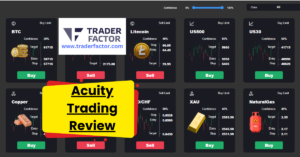Forex trading, or the trading of currencies on the foreign exchange market, has emerged as a lucrative investment opportunity for individuals worldwide. With its accessibility and potential for significant returns, it has gained immense popularity in recent years. As you seek to capitalize on the ever-changing global currency values, the question that lingers in your mind as an aspiring forex trader is, can you make money with forex trading?
Whether you are a novice intrigued by the potential of forex trading or an experienced trader seeking to refine your strategies, this article aims to provide valuable insights that will enhance your understanding of forex trading profitability. By arming yourself with knowledge about forex brokers and adopting good trading practices, you can increase your forex trading success rates in this dynamic market.
Table of Contents
ToggleOverview: Can Forex Really Make Money?
Forex trading offers unique opportunities for individuals to profit from the fluctuations in global currency values. However, it is crucial to approach this endeavor with caution and a realistic mindset. While there are success stories of traders who have achieved significant profits, it is also important to acknowledge the risks and challenges inherent in this market.
By examining the factors that contribute to trading profitability, such as market knowledge, risk management, trading strategies, emotional control, and continuous improvement, we aim to provide a comprehensive understanding of what it takes to thrive in forex trading.
In this article, we delve into the intricacies of forex trading profitability to shed light on forex trading income potential and the realities associated with it. We aim to provide valuable insights and information that will enable readers to make informed decisions when venturing into the dynamic world of forex trading.
By exploring the factors affecting forex trading profits in this market, we hope to equip aspiring traders with the knowledge and understanding necessary to navigate the complexities and maximize their chances of a forex trading profit and profitability.
What Makes Forex Profitable
The forex market is influenced by various factors that play a crucial role in determining trading profitability. Traders need to understand and navigate these factors to make informed decisions and maximize their chances of success.
In this section, we will delve deeper into the key factors that influence profitability in the forex market. These factors will provide valuable insights into how traders can adapt and thrive in this dynamic environment.
Market Knowledge and Education
One of the key factors that determine profitability in forex trading is knowledge and education about the market. Understanding the fundamentals of forex trading, such as how currency pairs work, market trends, and economic indicators, is essential. Additionally, staying updated with the latest news and developments in the global economy can help traders make informed decisions and seize more profitable trading opportunities.
Effective Risk Management
Successful forex traders are adept at managing risk. They understand the importance of setting stop-loss orders to limit potential losses and use proper position sizing techniques. Implementing risk management strategies helps protect capital and ensures that potential profits are not wiped out by one losing forex trade.
Trading Strategies and Analysis
Having a well-defined trading strategy is crucial for profitability in forex trading. Traders employ various strategies, such as technical analysis, fundamental analysis, or a combination of both, to identify entry and exit points in the market. Backtesting and refining these strategies over time can increase the chances of making forex trading profitable trades.
Discipline and Emotional Control
Forex trading requires discipline and emotional control. The ability to stick to a trading plan, avoid impulsive decisions, and manage emotions like fear and greed is essential. Successful traders maintain a rational mindset, avoiding emotional biases that can lead to poor trading choices.
Leverage and Margin Management
Leverage allows traders to control larger positions with a smaller investment. While leverage can help in achieving profits in forex trading, it also increases the risk of losses. Effective management of leverage and margin is essential to avoid overexposure and protect capital.

Market Timing and Volatility
Understanding market timing and volatility is critical in any forex trading strategy. Traders need to identify optimal entry and exit points based on market conditions and volatility levels. Profits can be maximized by capitalizing on volatile periods while avoiding low-activity periods.
Broker Choice and Platform Selection
Selecting a reputable forex broker and a suitable trading platform is imperative. Factors to consider include spreads, commissions, execution speed, customer support, and the availability of analytical tools. A reliable broker and a user-friendly platform can enhance currency trading’ efficiency and increase profitability.
Adaptability to Changing Conditions
Forex markets are highly dynamic, influenced by various economic, political, and global events. Successful traders adapt to changing market conditions and adjust their strategies accordingly. They are flexible and open to new approaches, enabling them to capitalize on emerging opportunities.
Monitoring Economic and Political Developments
Keeping a close eye on economic and political developments worldwide is vital for forex traders. Key events such as central bank decisions, geopolitical tensions, and economic indicators can have a significant impact on currency values. Staying informed helps traders make informed decisions and make trading forex profitable.
Continuous Evaluation and Improvement
Profitable forex traders continuously evaluate their performance and seek ways to improve. They analyze past trades, identify strengths and weaknesses, and adjust their strategies accordingly. Regular self-assessment and a commitment to ongoing learning are necessary for long-term success.
Patience and Long-Term Perspective
Forex trading requires patience and a long-term perspective. Profits may not be immediate, and successful traders understand the importance of sticking to their strategies even during periods of drawdown. They focus on consistent, sustainable profits rather than short-term gains.
Networking and Learning from Peers
Engaging with a community of fellow traders can provide valuable insights and learning opportunities. Networking with experienced traders, participating in forums, and attending webinars or workshops can enhance knowledge of financial instruments and improve trading skills.

Do People Really Make Money in Forex? Key Elements Of Profitable Forex Trading
In order to achieve profitability in forex trading, there are several key elements that successful traders focus on. These elements are based on extensive research and insights from industry experts. By incorporating these key elements into their forex trading approach, individuals can enhance their chances of long-term profitability.
However, it’s important to note that trading in the forex market carries inherent risks, and traders should always exercise caution, seek education, and consider the guidance of experienced professionals.
Here are the key elements of profitable forex trading:
Solid Trading Plan
A solid trading plan serves as the foundation for successful trading. It outlines the trader’s goals, preferred trading style, risk tolerance, and specific strategies for entering and exiting trades. A well-defined plan helps traders stay focused, make consistent decisions, and avoid impulsive trades driven by emotions.

Effective Risk Management
Profitable traders prioritize risk management to protect their capital. They set appropriate stop-loss orders to limit potential losses on each trade. They also diversify their portfolios by trading across different currency pairs or asset classes, minimizing the impact of any single trade. Additionally, they avoid excessive leverage, which can magnify both profits and losses.
Comprehensive Market Analysis
Profitable traders conduct thorough market analysis to identify trading opportunities. They use both technical analysis and fundamental analysis to assess market trends and factors that may impact currency values. Technical analysis involves studying charts, indicators, and patterns, while fundamental analysis examines economic data, geopolitical events, and central bank policies.
Discipline and Emotional Control
Discipline is crucial for profitable forex trading. Traders stick to their trading plan, follow their predefined strategies, and avoid making impulsive decisions based on fear or greed. They understand that emotions can cloud judgment and lead to poor trading outcomes. Developing emotional control through mindfulness techniques and maintaining a journal can help traders stay disciplined.
Appropriate Position Sizing
Profitable traders carefully determine the size of their positions based on their risk tolerance and the potential reward of each trade. They avoid risking too much capital on a single trade, ensuring that even if it results in a loss, it does not significantly impact their overall portfolio. Proper position sizing techniques, such as using a fixed percentage of capital per trade, help manage risk effectively.

Continuous Learning and Improvement
Successful traders understand that the forex market is constantly evolving, and staying updated is crucial. They engage in continuous learning by reading market analysis, attending webinars or seminars, and participating in trading communities. By staying informed about new strategies, tools, and market trends, they adapt their trading approach to changing market conditions.
Use of Risk Management Tools
Profitable traders leverage risk management tools to automate aspects of their trading and protect their profits. Trailing stops allow them to secure profits as the market moves in their favor while protecting against sudden reversals. Take-profit orders help lock in gains, and limit orders ensure that trades are executed at desired price levels. These tools minimize the need for constant monitoring and allow traders to manage risk more efficiently.
Focus on Consistency, Not Perfection
Profitable traders understand that consistent profitability is more important than chasing occasional big wins. They focus on achieving a positive overall performance over time by following their trading plan and strategies diligently. They avoid becoming overly fixated on individual trades and instead prioritize maintaining a disciplined and consistent approach.

Importance Of Developing A Solid Forex Trading Plan
Developing a solid trading plan is crucial for traders who want to achieve long-term success in the forex market. A trading plan provides guidance, enables objective decision-making, promotes effective risk management, ensures consistency, minimizes emotional influence, allows for adaptability, and helps traders measure their progress over time.
By following a well-defined plan, traders increase their chances of achieving profitability and building a sustainable trading career. Here are the key reasons why having a well-defined trading plan is important.
Guidance and Direction
A trading plan provides traders with clear guidance and direction for their trading activities. It outlines their goals, preferred trading style, and strategies to follow. Having a plan helps traders stay focused and avoid getting overwhelmed by market noise or impulsive trading decisions.

Objective Decision-Making
With a trading plan in place, traders can make objective decisions based on predetermined rules and criteria. The plan establishes specific entry and exit strategies, risk management guidelines, and criteria for trade selection. This helps remove emotions from the decision-making process and leads to more consistent and rational trading actions.
Risk Management
A trading plan includes risk management strategies and techniques. It helps traders define their risk tolerance, set appropriate stop-loss levels, and determine position sizing. By managing risk effectively, traders can protect their capital and minimize potential losses. A solid trading plan ensures that risk is always considered before entering a trade.
Consistency in Execution
One of the key benefits of a trading plan is that it promotes consistency in executing trades. Traders follow predefined strategies and rules consistently, avoiding random or impulsive trading decisions. Consistency improves overall performance and helps traders analyze the effectiveness of their strategies over time.
Minimizing Emotional Influence
Emotions can have a detrimental impact on trading decisions. Fear and greed can lead to impulsive actions and cloud judgment. However, a well-developed trading plan helps to minimize emotional influence. Traders who stick to their plan are less likely to be swayed by short-term market fluctuations or succumb to emotional biases that can negatively impact their trading outcomes.
Adaptability and Flexibility
While a trading plan provides structure, it should also allow for adaptability and flexibility. Market conditions change, and traders need to adjust their strategies accordingly. A solid trading plan includes provisions for adapting to changing market dynamics while maintaining consistency in risk management and execution.

Quantifiable Progress
A trading plan helps traders track their progress and performance. By defining specific goals and benchmarks, traders can evaluate the effectiveness of their strategies and measure their success over time. This allows for continuous improvement and provides a quantifiable framework for evaluating a forex strategy and trading returns.
Long-Term Success
Developing a solid trading plan sets the foundation for long-term success. It helps traders develop discipline, improve their skills, and maintain consistency in their approach. By following a plan, traders can build a sustainable trading career and increase their chances of achieving consistent profitability.
Professionalism and Discipline
Having a trading plan instills professionalism and discipline in traders. It ensures that they approach trading as a business, with clear goals, strategies, and risk management practices. Following a well-defined plan helps traders stay focused and disciplined in their trading activities, which is essential for consistent success.
Risk-Reward Optimization
A trading plan includes guidelines for identifying favorable risk-reward ratios. Traders can assess potential profits and potential losses before entering a trade, helping them make informed decisions that optimize their risk-to-reward ratio. This ensures that traders only take trades where the potential reward justifies the level of risk involved.
Time Management
A trading plan helps traders manage their time effectively. It outlines when to analyze the market, enter trades, and monitor positions. By having a structured plan in place, traders can avoid spending excessive time on unproductive activities and focus on executing their trading strategy efficiently.

How to Cut Losses And Let Profits Run in Forex
Cutting losses and losing money while letting profits run is a key principle in successful trading.
Here are strategies to achieve this:
Use of Stop-Loss Orders
A stop-loss order is an instruction to automatically exit a trade if the price reaches a specified level. It helps protect against significant losses by limiting the amount of capital at high risk now. Traders can set their stop-loss orders based on their risk tolerance and market analysis.

Trailing Stop-Loss
A trailing stop-loss is a dynamic order that adjusts as the market moves in the trader’s favor. It allows traders to lock in profits while giving the trade room to continue running. The trailing stop-loss moves in increments specified by the trader, thereby protecting gains and allowing for potential further upside.
Risk-Reward Ratio
The risk-reward ratio is a measure of the potential profit versus the potential loss of a trade. By assessing the ratio before entering a trade, traders can determine if the potential reward justifies the risk taken. A favorable risk-reward ratio ensures that the potential profit is greater than or equal to the potential loss.
Scaling Out Positions
Scaling out involves gradually reducing the size of a position as it becomes more profitable. Traders can take partial profits by closing a portion of the position while leaving the remaining portion open to capture further gains. This strategy allows traders to secure profits while still benefiting from extended price movements.
Price Action and Technical Analysis
Price action analysis involves studying the movement of price on a chart to make trading decisions. Technical analysis utilizes various indicators and tools to identify patterns and trends in price data. These approaches help traders identify optimal entry and exit points based on price behavior and market conditions.
Trusting Initial Analysis
Trusting the initial analysis is crucial for sticking to a trading plan. It involves having confidence in the analysis conducted before entering a trade and not being swayed by short-term market fluctuations or emotional reactions. Consistency in following the initial analysis helps traders stay focused and avoid impulsive decisions.
Moving Averages and Trendlines
Moving averages and trendlines are technical analysis tools used to identify trends and potential support and resistance levels. Moving averages smooth out price data, providing a visual representation of the trend. Trendlines connect consecutive highs or lows, helping traders identify the direction of the market and potential reversal points.

Avoiding Overtrading
Overtrading refers to excessive trading activity, which can lead to poor decision-making and increased risk exposure. Traders should focus on quality trades that meet their predefined criteria rather than taking every opportunity that arises. Maintaining discipline and following a well-defined trading plan can help avoid overtrading.
Psychological Preparedness
Successful trading requires emotional resilience and discipline. Traders must be prepared to accept losses and not let fear or greed dictate their decisions. Developing psychological preparedness involves managing emotions, maintaining a logical mindset, and adhering to risk management principles.
Regular Monitoring and Adjustments
Traders should regularly monitor their trades and the overall market conditions. This allows them to assess if adjustments need to be made to their stop-loss orders or profit targets based on new information or changing market dynamics. Regular monitoring helps ensure that trades remain aligned with the evolving market environment.
Using Traders’ Tools
Traders can utilize various tools such as trade journals, trade analyzers, and performance trackers for measuring forex trading profitability and evaluating their trading decisions and outcomes. These tools provide insights into trading patterns, profitability, and areas for improvement. By analyzing past trades and performance, traders can make informed adjustments to their strategies.

Practice Patience
Patience is essential when letting profits run. It involves resisting the temptation to close a winning trade prematurely and allowing it to reach its full potential. Traders must have confidence in their analysis and strategy, understanding that markets take time to develop and maximize profit opportunities.
Common Mistakes Forex Traders Make That Lead To Losses
In forex trading, it’s important to be aware of some common mistakes and take steps to avoid them in order to enhance your chances of profitability.
Lack Of A Trading Plan
A trading plan outlines a trader’s goals, strategies, risk tolerance, and criteria for entering and exiting trades. Without a well-defined plan, traders may make impulsive decisions based on emotions or market noise, leading to inconsistent and unprofitable trading.
Ignoring Risk Management
Risk management is crucial for preserving capital and avoiding significant losses. Traders should determine their risk tolerance, set appropriate stop-loss orders, and manage position sizes effectively. Ignoring risk management can lead to excessive losses that outweigh potential gains.

Overleveraging
Leverage amplifies trading positions, providing the opportunity for increased profits, but it also magnifies losses. Using excessive leverage can wipe out an already trading account quickly if trades move against the trader. Properly managing leverage is vital for long-term profitability.
Chasing Losses
Chasing losses refers to making impulsive trades in an attempt to recover previous losses. This behavior can lead to emotional decision-making, taking higher risks, and further losses. It is important to have discipline and stick to the trading plan instead start trading out of chasing losses.
Ignoring Fundamental Analysis
Fundamental analysis involves evaluating economic data, news events, and company financials to assess the intrinsic value of an asset. Ignoring fundamental factors can result in missed opportunities or being ill-prepared for market-changing events, which can hinder profitability.

Overtrading
Overtrading occurs when a trader takes excessive trades without proper analysis or due to a compulsion to be constantly active in the market. This can lead to increased transaction costs, reduced focus on quality trades, and potential losses.
Lack Of Discipline
Discipline is essential for consistent profitability. It involves sticking to a trading plan, following predetermined rules, and avoiding impulsive decisions. A lack of discipline can result in inconsistent performance and hinder long-term profitability.
Not Adapting To Market Conditions
Markets are dynamic, and trading strategies must adapt to changing conditions. Ignoring market shifts or failing to adjust strategies accordingly can lead to missed opportunities or taking trades that are no longer viable, hindering profitability.
Neglecting Technical Analysis
Technical analysis helps identify patterns, trends, and key levels in price charts. Neglecting technical analysis can result in missing potential trade setups or entering trades without a clear understanding of the market’s dynamics, which can hinder profitability.

Overcomplicating Strategies
Using overly complex trading strategies can lead to confusion and increased risk. Simple and well-defined strategies are often more effective for consistent profitability, as they are easier to execute and understand.
Not Learning From Mistakes
Learning from past trading mistakes is crucial for growth and improvement. By analyzing previous trades, identifying weaknesses, and making adjustments, traders can enhance their strategies and avoid repeating costly errors.
Following The Herd
Blindly following the crowd or relying solely on others’ trading recommendations can lead to poor decision-making. It is important to conduct independent analysis, make informed decisions based on personal research, and have a clear understanding of the rationale behind each trade.
Focusing Solely On Profits
While profitability is the ultimate goal, focusing solely on profits without considering risk management and long-term goals can lead to excessive risk-taking and potential losses. Traders should maintain a balanced approach that considers both risk and reward.

Ignoring Psychological Factors
Emotional factors such as fear, greed, and impatience can significantly impact trading decisions. Ignoring these psychological factors can result in impulsive trades, irrational risk-taking, and poor judgment, hindering profitability. Developing emotional intelligence and maintaining discipline are essential for successful trading.
Conclusion
So, is forex trading worth it? Forex trading has the potential to be profitable, but it is important to understand the reality of the market. While some traders may achieve substantial profits from currencies trade, it is not a guaranteed pathway to financial success. Successful forex trading requires a combination of knowledge, skills, discipline, and effective risk management.
It is crucial for traders to have a solid understanding of fundamental and technical analysis, as well as staying updated with market trends and news events. Implementing a well-defined trading plan, managing risk effectively, and maintaining a disciplined mindset are key factors in achieving profitability.
However, it is also important to acknowledge the pros and cons of forex trading and that it carries inherent risks. Market volatility, unexpected economic events, and the constant presence of human emotions can lead to losses. Traders must be prepared to accept losses as part of the trading process and learn from their mistakes.
Disclaimer:
All information has been prepared by TraderFactor or partners. The information does not contain a record of TraderFactor or partner’s prices or an offer of or solicitation for a transaction in any financial instrument. No representation or warranty is given as to the accuracy or completeness of this information. Any material provided does not have regard to the specific investment objective and financial situation of any person who may read it. Past performance is not a reliable indicator of future performance.

















